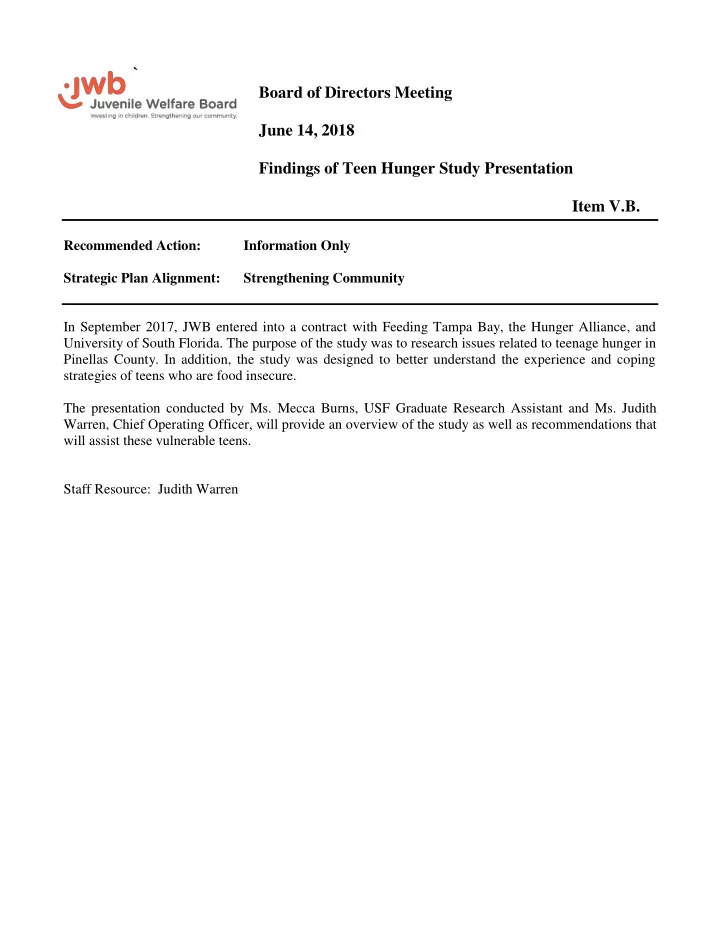

` Board of Directors Meeting June 14, 2018 Findings of Teen Hunger Study Presentation Item V.B. Recommended Action: Information Only Strategic Plan Alignment: Strengthening Community In September 2017, JWB entered into a contract with Feeding Tampa Bay, the Hunger Alliance, and University of South Florida. The purpose of the study was to research issues related to teenage hunger in Pinellas County. In addition, the study was designed to better understand the experience and coping strategies of teens who are food insecure. The presentation conducted by Ms. Mecca Burns, USF Graduate Research Assistant and Ms. Judith Warren, Chief Operating Officer , will provide an overview of the study as well as recommendations that will assist these vulnerable teens. Staff Resource: Judith Warren
Teen Food Insecurity in Pinellas County, FL Technical Report Mecca Burris, M.A. 1 , Sarah Bradley, M.A. 1 , Kayla Rykiel 2 , Danielle Hintz, M.A. 3 , Paige Tucker, M.A. 3 ,Elisa Shannon, M.B.A. 4 Faculty Advisor: David Himmelgreen, Ph.D. 1 1 Department of Anthropology, University of South Florida 2 Department of Chemistry, University of South Florida 3 Juvenile Welfare Board of Pinellas County 4 Feeding Tampa Bay
Food Insecurity 38 Teens limited or uncertain access to adequate amounts of safe and nutritious foods (USDA ERS, 2017) Goals: Survey Identify & Photovoice Focus Understand Groups Apply 5 sites
RESULTS Demographics (n = 38) - 11 - 18 y (avg. = 13.7) SNAP: 34% - Avg. grade = 8.8 Gender - Female: 37% - Male: 63% Race & Ethnicity - Biracial: 11% - Black: 46% - White: 36% Food Secure Food Insecure - Hispanic: 41% 56% 44%
Factors Limiting Food Security Perceived Quality of School Food School Issues
Factors Limiting Food Security Perceived Quality of School Food School Issues Quantity of Food
“ “There’s barely enough food on the tray for someone to eat and get some energy from it. Pretty much, schools aren’t providing enough food for children to eat. So that’s why people are still hungry afterwards, even though lunch was like, two hours later… And if they want to get another one of these then it costs more money.”
Factors Limiting Food Security Vending Machine Issues Perceived Quality of School Food School Issues Rules Quantity of Food Time
Factors Limiting Food Security Food as Punishment Lack of Autonomy Preference Public Stigma Assistance Bullying & Fear
“ T1: “Yeah, it’s embarrassing.” T2: “When all your other friends are around. You don’t take as many as you want to. If you don’t eat at home or your sisters and brothers don’t eat at home…you want to take more than one. But you don’t want to take it in front of other people.”
Factors Limiting Food Security Food as Punishment Lack of Autonomy Food Preference Running Out Public Stigma Assistance Bullying & Socioeconomics Fear Issues with Current Programs Food Waste Food Household Prices Makeup
Coping Strategies Used by Teens Illegal Reliance on Strategies Community Stealing Organizations Selling Drugs Churches “Selling Neighbors Themselves” Friends
“ “This girl she couldn't get food so people would like pick on her, and then one day she came to school and she had her backpack. At the end of the day the teacher couldn’t find the iPad so they were going through and checking everyone’s backpack and then the teacher dumped out her backpack and she had like canned foods and everything fell onto the floor and stuff because she had to steal it from the store.” “Kids that steal, they’re hungry”
Coping Strategies Used by Teens Cheap & Reliance on Illegal Reliance on Convenient Teachers Strategies Community Foods Providing Stealing Organizations Snacks/Food Selling Drugs Churches Classroom Eating “Selling Neighbors Extra Assistance Themselves” Friends Working
Perceived Consequences Poor School Poor Behavior & Low Energy Feeling Unwell Performance Emotional Health & Focus Moody Medical Issues Antisocial Dehydration Hunger/ Depression Starvation
“ “Some people—it’s probably because they get insecure, with body changing, or they’re being rude to you, so you don’t feel like you have an appetite. So, you pretty much just go and pick up your food and throw it out and wait there until lunch ends because you don’t feel good about yourself…”
Conclusion “We cannot afford to systematically starve our children even by an indirect way, even in a mild degree” – Horace Makechnie 1897, American Medical Association Annual Meeting. - Perception is powerful - Stigma is a barrier - Policies may inadvertently contribute to both teen food insecurity and food waste - Teachers and Classroom as a space for intervention
Acknowledgements Juvenile Welfare Board of Pinellas County & Childhood Hunger Initiative Danielle Hintz and Paige Tucker Feeding Tampa Bay Elisa Shannon Hunger Action Alliance David Himmelgreen University of South Florida Erin Stassin Researchers: Sarah Bradley, Mecca Burris, Kayla Rykiel Pinellas Park’s Youth Park Teen Center Special thanks to all the teens Richard Rock Sanderlin Neighborhood Family Center who participated! Sharina Morrow Hispanic Outreach Center Joanna Boruk Police Athletic League, Pinellas County Neil Brickfield
Recommend
More recommend